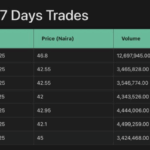Australia's share market has capped off a grim week for the market as stock-specific shocks and hot inflation reports weighed on sentiment.
The S&PASX200 fell 3.6 points, or 0.04 percent, to 8,881.9 on Friday, while the Broader All Ordinaries fell 0.9 points, or 0.01 percent, to 9.178.
The local market underperformed most of its peers in October, with Japan's Nikkei and South Korea's KOSPI gaining about 0.5 percent each and Wall Street's S&P500 and Nasdaq hitting record highs.
“It's a pretty disappointing performance given what's going on in the rest of the world,” IG Markets analyst Tony Sycamore told AAP.
Consumer discretionary and real estate stocks have declined this week, each falling more than 4.5 percent, as investors re-raised their expectations of an interest rate cut after higher-than-expected inflation data for the September quarter.
“Some of these interest rate-sensitive stocks have moved higher, and are looking for more rate cuts, and that's where I see real headwinds for some of these sectors, whether it's property, consumer-facing stocks and so on,” Mr Sycamore said.
“I'm still not deciding on a more neutral monetary setting, but that won't happen next week.”
Seven out of 11 local sectors improved on Friday, led by energy and communication stocks, while financials and raw materials also provided support as gold stocks jumped.
Northern Star, Evolution and Newmont each rose more than three per cent after spot gold surged, but by Friday's ASX close the precious metal had again slipped below $US4000 ($A6,110) an ounce.
Iron ore giants Rio Tinto, BHP and Fortescue all eased in the previous session, but closed in on gains for the week as iron ore and copper prices strengthened.
Rare earth and critical minerals producers Lynas, Iluka and Liontown Resources bid to cap a volatile fortnight for their respective sectors, with trade deals, rumors and commodity price forecasts triggering wild price action.
The big four banks were mixed on Friday, with Westpac and CBA rising, while NAB traded flat and ANZ declined 0.6 per cent after announcing a more than $1 billion rise in second-half earnings on a number of key items.
Despite the change in investor sentiment, the broader sector managed to gain 0.15 per cent for the week.
Turning to insurers, broker Steadfast dropped nearly 10 percent after announcing boss Robert Kelly would stand aside pending an external investigation into a workplace complaint against him.
Energy stocks outperformed the stock market, gaining 0.6 per cent and 1.4 per cent for the week, boosted by Woodside and uranium producers, after the US announced plans to boost its nuclear capacity.
The health care sector has lost more than eight percent of its value since Monday after investors sold CSL shares at an almost seven-year low following a profit warning for the second time in as many months.
Mayne Pharma fell by almost a third on Friday after Federal Treasurer Jim Chalmers flagged that he would block US pharmaceutical giant Cosset's $672 million takeover bid for the company, citing risks to the economy.
Utilities shares fell 1.1 per cent to end the week, seeing an even bigger drop in its price after Origin's quarterly update failed to impress.
The Australian dollar is being bought at 65.41 US cents, down from 65.92 US cents at 5pm on Thursday.
On ASX:
* The S&P/ASX200 fell 3.6 points, or 0.04 per cent, to 8,881.9
* The broader All Ordinaries fell 0.9 points, or 0.01 per cent, to 9,178.
Currency Snapshot:
One Australian dollar trades for:
* 65.41 US cents, up from 65.92 US cents on Thursday
* 100.68 JPY, from 100.88 JPY
* 56.54 euro cents, from 56.70 euro cents
* 49.74 British pence, from 49.89 British pence
* 114.28 NZ cents, from 113.98 NZ cents










